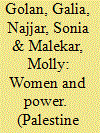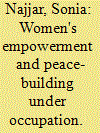| Srl | Item |
| 1 |
ID:
130516


|
|
|
|
|
| Publication |
2011.
|
| Summary/Abstract |
Golan: I think we all agree that we need to find ways that women can be more power full, and this can be anywhere from economic freedom in the household all the way up to participation in decision-making. The question is: What are the best ways to do this'? I think economic independence is one way in which women can begin to assert themselves and be able to at least stand on their own. not necessarily in terms of acting independently outside the home or on their own, but rather in terms of being able to be a full person. vis-a-\='is the other people within the household, whether a husband or a brother or a Father. It begins there, and then we must look for ways to extend this so that women may have an actual role in decision-making. starting from the home and continuing all the way up to government.
Najjar: I would completely agree with you if this were under normal circumstances, perhaps under a real democracy. My concern is more in terms of wait has been happening in an environment of ongoing occupation and annexation. Whereas the household is a very important component. the largest component is that women are continuously living under a paradigm of oppression and lack any forms ourself determination, access, mobility, freedom of expression. identity or cultural activity. There is a little bit of leeway here and there, but I do not see how women can reach any type
|
|
|
|
|
|
|
|
|
|
|
|
|
|
|
|
| 2 |
ID:
130504


|
|
|
|
|
| Publication |
2011.
|
| Summary/Abstract |
As a contribution to the discussion on women's empowerment in the Palestine-Israel Journal, this article reflects on the possibilities for women's empowerment and peace-building under a condition of prolonged occupation. Specifically, it focuses on the near-impossibility of the manifestation of empowerment and peace for those who have been disenfranchised under a paradigm of extreme oppression in the context of Occupied Palestine. If one uses Eileen Kuttab's contextualization of Palestinian empowerment as historically being embodied in practices of mobilization and resistance, then being allowed neither mobility nor the right to organize resistance to Israeli military violence makes it clear that the prospects for successful peace-building and the realization of Palestinian women's empowerment face significant obstacles.1 This is a result of the autocratic imbalance of power that has seeped from external into internal dynamics. The external factors are the architects and participants of the occupation comprised of an illegal Israeli military occupation force of women and men, abetted by an international community that does not adhere to its mandates to the fullest extent and follows an aid praxis that further serves to annihilate mobilization and resistance. The internal obstacles to women's empowerment are an extension of the external, that is, elements of the Palestinian local governing structure that was meant to be temporary in nature.
|
|
|
|
|
|
|
|
|
|
|
|
|
|
|
|